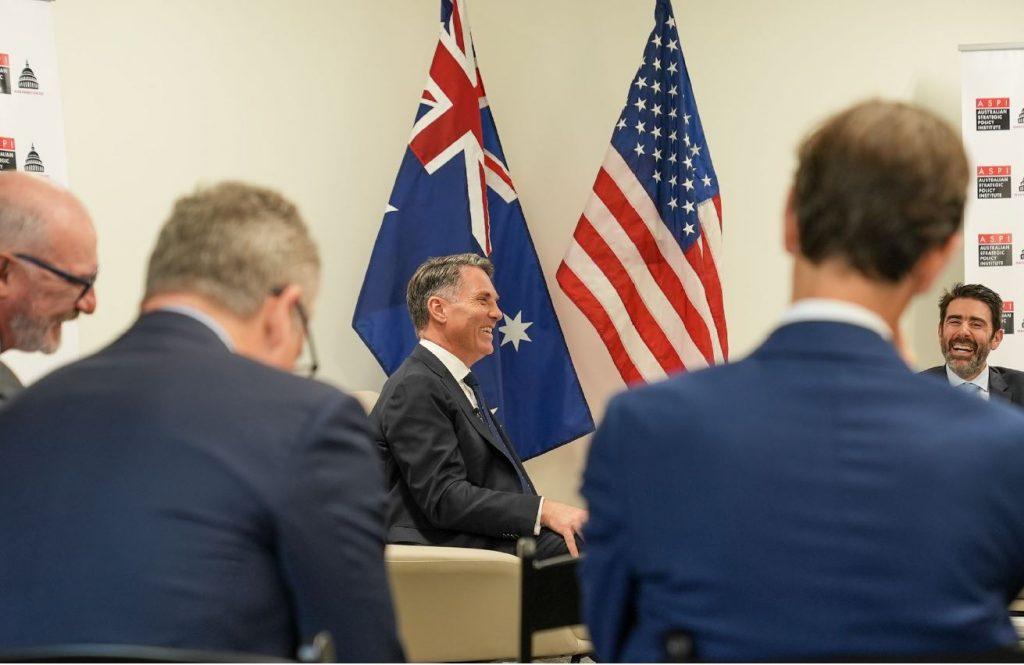
Harnessing resources from industry through to armed forces, Australia, the United States and their allies must together develop an effective level of military power in the Indo-Pacific to avoid ‘a catastrophic failure of deterrence’, says Defence Minister Richard Marles.
Opening ASPI’s new office in Washington, Marles expanded on the warning he delivered this week that China was engaged in the biggest military build-up ‘anywhere at any time’ since the end of World War II.
A catastrophic failure of deterrence looked like what’s happening in Ukraine, Marles said in answer to a question from ASPI Executive Director Justin Bassi.
That’s what happens when a power engaged in a military build-up thinks it worth the risk of utilising that power. ‘And we are seeing a catastrophe unfold in Ukraine. I think it’s really important that we are doing everything we can to maintain a balance of power in the Indo-Pacific.’
That, said Marles, rolled off the tongue easily, but it was a big challenge when it was happening in our own backyard. ‘I don’t have all the answers to it.’
But it was clear that the system of alliances was central.
‘From our point of view, the alliance with the United States has never been really more important, and that’s a big thing to say, because it has been very important over its life, but it’s probably been never more important than it is right now in terms of providing us with security and remains very much the cornerstone of the way we see the world,’ Marles said.
There’d been enormous progress over several decades in terms of the degree of interoperability between our defence forces, the extent to which Australians were embedded in the American system and vice versa.
‘We need to be building that level of seamless interaction within our industrial basis as well. And that’s been a big theme of the conversations we’ve been having this week.’
Marles said ASPI, in its third decade, was a leading think tank in Australia and an enormous resource to him as someone who did not have a background in defence and strategic policy. ‘But as it is always the case with us in politics needing to get on a horse pretty quickly, ASPI was fundamentally important to me in giving me the education I needed around strategic policy, around defence. And in so many ways, the product of ASPI is critically important, not only in informing the Australian public, but those of us in government who seek to play a role in this space.’
Washington was a centre of government, power and thought, Marles said, and it was important for ASPI to be there. ‘Square inch by square inch, there are more think tanks in this place than anywhere else in the world. And so it makes complete sense that ASPI would open its first office overseas right here to take the advantage of that, to be in the stream of that thought, to feed that back into Australia’s thinking around strategic policy.’
Marles noted an observation from Bassi that the flow of information in the ASPI Washington office would be a reciprocal process. ‘It’s not just about sucking in that information, it’s about inserting into the stream of thought here, how we see the world and the challenges that Australia faces and giving an Australian flavour to the nature of the discussion, which is so important, that takes place in this town.’
A gracious Marles acknowledged that the office had been approved by the previous defence minister, Peter Dutton. ‘I do want to acknowledge Peter Dutton, my friend, and my predecessor, as minister for defence. He made the decision and it’s often the case in the way our government works, that immediately after an election, you end up being the beneficiary, as the one who’s cutting the ribbon, of the work that was done before you. I’ve been through that process on the other side; it could be a little frustrating.’
In answer to a question from Bassi, Marles said having sources of quality, authoritative, reliable information and thought was profoundly important. The era of social media and fake news had sharpened the need for a think tank like ASPI to provide original and authoritative thought that could inform the way commentary, and ultimately information, was distributed to citizens.